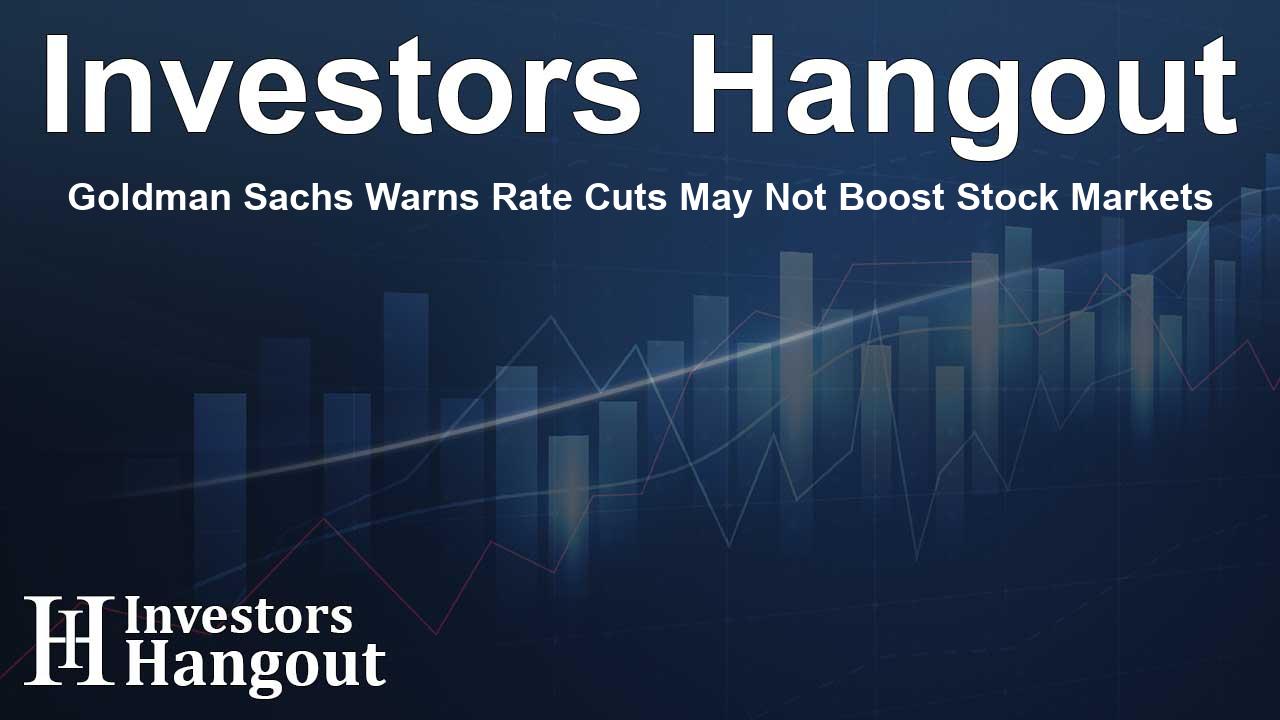Goldman Sachs Warns Rate Cuts May Not Boost Stock Markets

Concerns Over Federal Reserve Rate Cuts
Amid discussions of a potential Federal Reserve rate cut, analysts at Goldman Sachs are voicing reservations about the expected surge in the stock market that many investors are hoping for. A leading strategist from the firm suggested that an increase in market activity may not follow such monetary policy changes as expected.
Money Market Funds and Their Stability
Despite the anticipation surrounding upcoming Fed policies, investors, particularly those following Federal Reserve Chair Jerome Powell’s cues, are keenly awaiting his speeches during significant economic events. Many are speculating whether a rate reduction could lead to a substantial inflow of funds into equity investments. Tony Pasquariello, the head of hedge-fund strategy at Goldman Sachs, has cautioned that the $7.186 trillion currently residing in U.S. money-market funds may not see a sharp transition to equities following any rate cuts. He emphasizes, "There is no massive influx of capital waiting to be deployed into the stock market."
Historical Context of Money Flow
Pasquariello's insights draw from historical trends, mentioning that similar patterns were observed in previous economic cycles, where the expected outflows from money-market funds did not materialize when the Fed decreased rates. In particular, the 2007-2008 financial crisis did not result in significant capital movement from money markets to stocks, as investors continued to seek safety and stability.
Contrasting Views on Market Dynamics
While Goldman Sachs presents a cautious outlook, other experts have a differing perspective. Notably, Ed Yardeni, president of Yardeni Research, believes that a reduction in rates could invigorate an already robust stock market, potentially leading to a heightened risk of trading based on fear of missing out (FOMO). Wealth managers and market strategists are divided on their predictions, often reflecting their convictions about economic health and consumer spending.
Key Insights from Notable Investors
In recent commentary, billionaire investor Bill Ackman expressed optimism, suggesting that with money market funds soaring to a historical high of $7.4 trillion, there could be a significant shift towards equities in the case of rate cuts. Each perspective brings a different flavor to the conversation surrounding potential Fed actions and their implications on the stock market.
Current Market Trends
Recent analysis brings attention to the performance of various investment instruments, including the Schwab Government Money Market ETF SGVT and the iShares Prime Money Market ETF PMMF, which reported slight increases of 0.36% year-to-date. In contrast, the SPDR S&P 500 ETF Trust SPY and the Invesco QQQ Trust ETF QQQ have shown some retracement, with SPY reflecting changes at $642.92, and QQQ at $576.22 as per recent data.
Conclusion: Preparing for Financial Shifts
As investors navigate these complex market dynamics, the uncertainty surrounding Federal Reserve decisions can produce both opportunity and risk. Analysts and investors alike must weigh the benefits of potential rate cuts against historical market behaviors. Making informed decisions in this landscape requires careful consideration of numerous factors, including individual investment goals and market conditions.
Frequently Asked Questions
What does Goldman Sachs say about rate cuts?
Goldman Sachs expresses skepticism, suggesting that anticipated rate cuts may not lead to a stock market boom.
Why are investors concerned about money markets?
Many believe that significant funds in money market accounts may not shift to equities even after rate cuts, as seen in previous cycles.
How might the market change if rates are cut?
Some analysts believe rate cuts could create a FOMO-driven rally in stocks, while others are more cautious.
What are the latest trends in ETFs?
Recent data shows slight increases in money market ETFs like SGVT and PMMF, while broader market ETFs like SPY and QQQ faced minor declines.
What should investors consider moving forward?
Investment strategies should consider historical data, the potential for rate changes, and individual financial goals in a volatile market environment.
About The Author
Contact Addison Perry privately here. Or send an email with ATTN: Addison Perry as the subject to contact@investorshangout.com.
About Investors Hangout
Investors Hangout is a leading online stock forum for financial discussion and learning, offering a wide range of free tools and resources. It draws in traders of all levels, who exchange market knowledge, investigate trading tactics, and keep an eye on industry developments in real time. Featuring financial articles, stock message boards, quotes, charts, company profiles, and live news updates. Through cooperative learning and a wealth of informational resources, it helps users from novices creating their first portfolios to experts honing their techniques. Join Investors Hangout today: https://investorshangout.com/
The content of this article is based on factual, publicly available information and does not represent legal, financial, or investment advice. Investors Hangout does not offer financial advice, and the author is not a licensed financial advisor. Consult a qualified advisor before making any financial or investment decisions based on this article. This article should not be considered advice to purchase, sell, or hold any securities or other investments. If any of the material provided here is inaccurate, please contact us for corrections.
